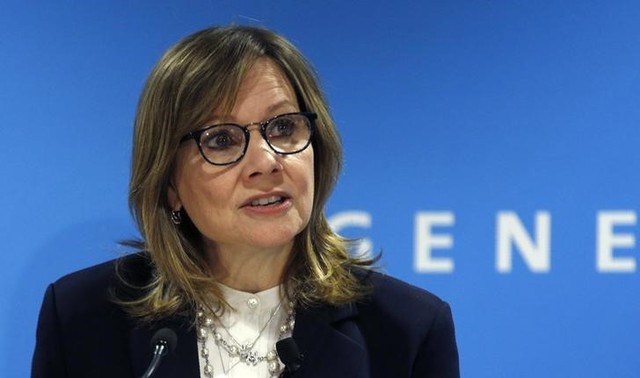FILE PHOTO – General Motors Chairman and CEO Mary Barra speaks at GM’s press conference at the North American International Auto Show in Detroit, Michigan, U.S., January 16, 2018. REUTERS/Rebecca Cook

By David Shepardson
WASHINGTON (Reuters) – General Motors chairman and chief executive Mary Barra met on Tuesday with U.S. regulatory chiefs, weeks before the Trump administration plans to decide whether to revise landmark fuel efficiency standards through 2025.
After Reuters learned of the meetings, GM spokesman Pat Morrissey confirmed Barra had met the heads of the Environmental Protection Agency and Transportation Department.
At the meeting, the GM CEO “reconfirmed our priorities for modernizing fuel economy standards, which is the need for one national set of requirements and the need to comprehend new technology developments like increased shared and autonomous electric vehicles,” Morrissey said.
Automakers are pressing the administration to reach agreement with California to maintain a nationwide set of fuel efficiency requirements.
California Air Resources Board chair Mary Nichols said in January the board does not believe the standards should be lowered but is willing to discuss modifications if warranted. “Absent any such evidence, we will certainly resist any changes,” Nichols said.
Car companies hope to avoid a potential legal battle between federal regulators, many state attorneys general and environmental groups that could leave them in limbo about future rules.
The manufacturers also want rule changes to address lower gasoline prices and a shift in U.S. consumer preferences to larger, less fuel-efficient vehicles.
Industry executives have not publicly asked for specific reductions in the requirements negotiated with the Obama administration in 2011, that aimed to double average fleet-wide fuel efficiency to about 50 miles (80 km) per gallon by 2025.
The Obama administration said the rules would save motorists $1.7 trillion in fuel costs over the life of the vehicles but cost the auto industry about $200 billion over 13 years.
Auto officials say the Trump administration is considering proposing a significant reduction in the requirements. Any changed regulation will not be finalized until next year.
California’s emissions rules are followed by a dozen states including New York and Pennsylvania and the District of Columbia that account for about 40 percent of U.S. vehicle sales.
Other automakers also have been holding meetings with regulators in recent weeks as have environmental groups as others. A meeting is planned this week between EPA officials and Ford Motor Co’s top environment and safety officer, officials said.
The EPA is expected to announce by April the existing 2022-2025 requirements are “not appropriate,” but it is unclear precisely when EPA and the Transportation Department will unveil proposed reductions in the requirements.
Two administration officials and several automakers told Reuters the timing of proposing reductions in the requirements or new flexibilities for automakers remained in flux. EPA officials suggested a proposal could come in late May or June, while the Transportation Department is pushing for a speedier unveiling of a proposal, automakers say.
In June, New York state’s attorney general, Eric Schneiderman, and 12 other top state law enforcement officials said they would mount a court challenge to any effort to roll back vehicle emission rules.
The Obama administration sought to “lock in” the rules by announcing in January 2017 the completion of a “midterm review” to determine the feasibility of the 2022-2025 model year rules ahead of an April 1, 2018 deadline.
In March 2017, Trump announced he would reopen that review and suggested he would soften the mandates. “The assault on the American auto industry is over,” he told autoworkers in Michigan.
(Reporting by David Shepardson; Editing by David Gregorio)


